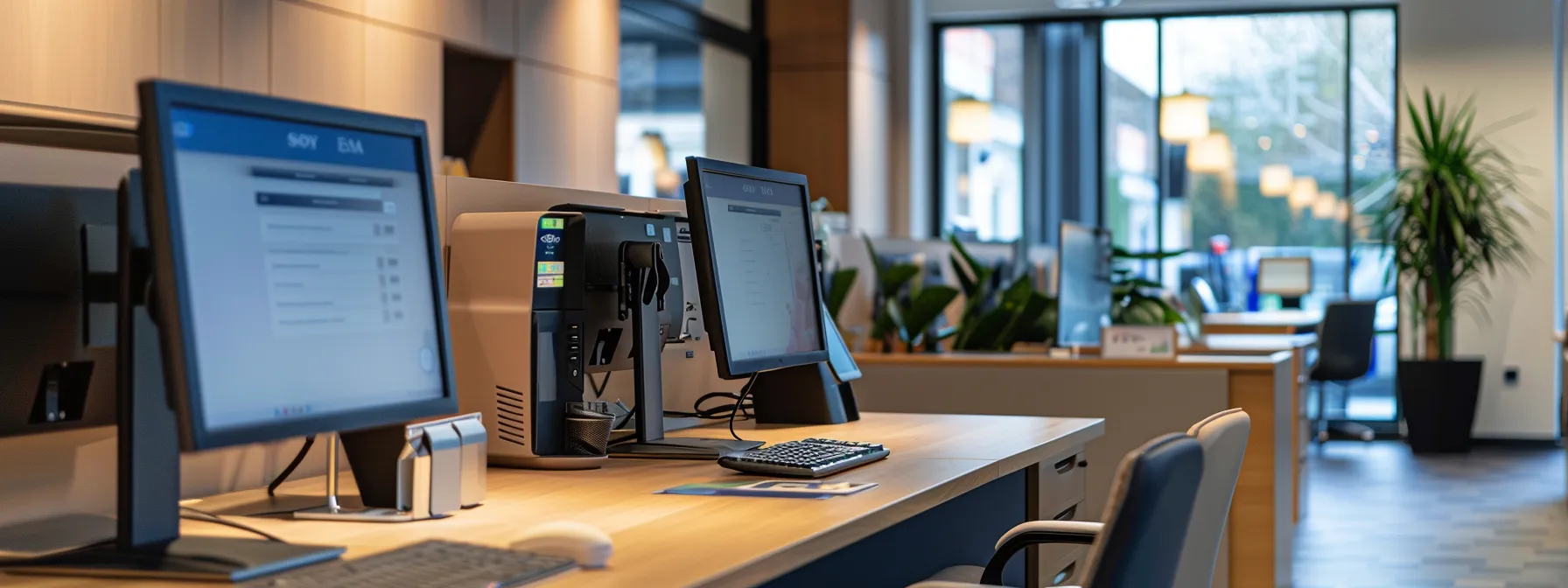Handling cheques securely is critical for any business, yet many still overlook the necessary practices. In fact, nearly 30% of businesses report fraud related to cheque mishandling. This blog post will explore essential practices for securely storing and handling your cheques, including creating a secure storage environment and utilizing technology for enhanced security. By following these guidelines, business owners can gain confidence in their cheque management and reduce the risk of fraud, ensuring convenience and protection for their transactions, whether they receive cheques at the office or via a post office box.
Understand the Importance of Secure Cheque Storage

Secure cheque storage is essential for safeguarding sensitive financial information. Businesses must recognize that cheques contain important details that, if compromised, can lead to unauthorized access to funds. By implementing stringent storage practices, companies can protect themselves from fraud and loss.
In a world where digital transactions are on the rise, understanding cheque security remains paramount, especially for companies using a payment gateway. Storing cheques securely helps ensure that data processing is handled properly, reducing the risk of data breaches that could expose financial details to unauthorized parties.
Accessibility to cheques must be limited to authorized personnel only. This minimizes the risk of internal theft or mishandling of financial documents. Employing secure storage solutions, such as locked cabinets or safe rooms, can significantly reduce the chance of unauthorized access.
Moreover, secure cheque storage supports better management of business finances by maintaining an organized record. Proper handling of cheques contributes to streamlined accounting practices, allowing businesses to keep track of cash flow and interest rates more effectively. This level of diligence establishes trust with clients and vendors alike.
A secure environment is essential for storing your cheques. Let’s explore how to create that safe space, protecting your business’s finances with care.
Develop a Secure Storage Environment

Implementing a restricted access policy is crucial for managing cheque-related expenses and preventing potential failures in security. Utilizing locked storage solutions and maintaining a secure digital backup can significantly enhance the protection of physical property and financial data, including credit card payments. These measures, alongside biometric security options, streamline cheque handling while safeguarding sensitive information effectively.
Implement a Restricted Access Policy
Establishing a restricted access policy is vital for ensuring that only authorized personnel can handle sensitive documents, such as cheques. This not only minimizes the risk of data loss from internal theft or mishandling but also fosters a culture of accountability. By integrating robust security measures, such as firewalls and controlled entry points, businesses can reinforce their overall procurement strategy, ensuring that contracts and financial records remain secure.
Training staff on the importance of this policy is equally essential, as understanding the management of cheques can significantly reduce security breaches. For instance, periodic reviews of access logs can help identify unauthorized attempts to access secure areas. By doing so, companies mitigate the potential fees associated with data loss while enhancing their compliance and risk management practices in financial operations.
Utilize Locked Storage Solutions
Utilizing locked storage solutions is a fundamental practice for enhancing physical security within any organization handling cheques. Secure cabinets or safes can effectively mitigate the risk of unauthorized access, ensuring that sensitive information remains protected from internal threats and external breaches. By complying with industry regulations, businesses reinforce their commitment to maintaining equity in financial operations while safeguarding important documents from potential malware attacks.
Implementing these secured storage options not only protects physical assets but also streamlines cheque management processes. For example, regular audits of access to locked areas can uncover any discrepancies or attempts at unauthorized entry, allowing companies to address vulnerabilities promptly. This proactive approach to security creates a safer environment for financial operations and builds trust with clients and stakeholders, knowing that their sensitive information is in good hands.
Maintain a Secure Digital Backup
Maintaining a secure digital backup is critical for effective vulnerability management in cheque handling. Businesses should implement regular backups of their accounting ledgers, especially those containing transaction details linked to point of sale systems. This practice not only protects sensitive financial information from accidental loss but also ensures that data is recoverable in the event of a cyber incident or equipment failure, thereby reducing potential vulnerabilities.
Using encrypted storage solutions for digital backups further enhances security by safeguarding sensitive information against unauthorized access. For example, integrating backup systems with existing compliance licenses can help companies meet industry regulations and standards. By prioritizing secure digital backups, businesses can create a robust framework that protects against threats, allowing for smoother operations and greater confidence in their financial processes.
After ensuring a secure storage space, attention must turn to how cheques are handled. The process of receiving and processing them is just as crucial, shaping the foundation of every transaction that follows.
Establish Procedures for Receiving and Processing Cheques

Verifying all cheques upon receipt is a critical step in secure cheque handling, protecting against fraudulent activities that could compromise personal data. Utilizing security features found on modern cheques further enhances this process. Furthermore, training employees on cheque handling best practices ensures consistent adherence to these procedures, forming a robust framework for internal audit and compliance with jurisdictional regulations.
Verify All Cheques Upon Receipt
Verifying all cheques upon receipt is a crucial practice for businesses to safeguard their financial interests. Employees should be trained to inspect important details, such as the payer’s signature, the amount, and the date. This early verification step can prevent potential damages linked to fraudulent cheques, protecting the deposit account from unauthorized transactions.
Engaging with a financial institution during the verification process adds an extra layer of security. Institutions often provide warranty services that can cover losses incurred by fraud. By establishing a consistent verification procedure, businesses not only secure their cheques but also foster a culture of diligence among employees, ensuring that all transactions are thoroughly reviewed before processing.
Use Security Features on Cheques
Using security features on cheques is imperative for businesses aiming to safeguard their financial transactions and mitigate risks. Features such as watermarks, micro-printing, and color-shifting ink make cheque fraud more difficult, thus enhancing overall risk management. By ensuring that each cheque includes advanced security measures, companies actively reduce the chances of electronic capture by unauthorized mobile devices, which could lead to negligence in tracking and protecting sensitive financial data.
Moreover, encryption technology plays a crucial role in securing cheque information during digital transactions. Implementing encrypted cheque layouts can bolster the protection of mutual fund payments and other sensitive transactions from external threats. By leveraging these security features, businesses can foster trust with clients and partners, knowing they have taken proactive steps to safeguard their financial interactions.
Train Staff on Cheque Handling Best Practices
Training staff on cheque handling best practices is vital for effective financial management. Employees must understand the reconciliation process, ensuring that each cheque received is accurately compared with the records of the bank account. This practice minimizes discrepancies that can arise from incorrect payments and helps maintain transparency, particularly concerning the payee‘s information.
Furthermore, integrating a unified payments interface can streamline cheque handling tasks and improve overall efficiency. Teaching employees the reason behind strict cheque verification helps create a culture of diligence within the organization. This commitment to proper procedures not only protects the company’s financial integrity but also reinforces trust with clients and partners.
After setting clear procedures for handling cheques, the next step is to fortify that trust with technology. Enhanced security measures ensure each transaction stands strong against risk, giving peace of mind to every business owner.
Utilize Technology for Enhanced Security

Employing cheque scanning tools enhances efficiency by processing transactions accurately and quickly. Implementing cheque fraud detection software significantly reduces risks associated with fraud by utilizing advanced features like magnetic ink character recognition. Integrating secure digital platforms for cheque management streamlines workflow while minimizing the chances of misplacing or accidentally disposing of important documents, ultimately supporting solid risk assessment practices and secure deposit cash processes.
Employ Cheque Scanning Tools
Employing cheque scanning tools is a key practice for enhancing security in cash handling operations. These tools streamline the verification and processing of cheques, allowing businesses to efficiently manage their payment methods while minimizing the risks associated with fraudulent activities. By integrating scanning technology, companies can ensure accurate recording of transactions, which directly supports better cash flow management.
Moreover, cheque scanning tools contribute to a more organized financial environment, reducing the chances of misplaced documents. As businesses explore contactless payment solutions, the role of secure cheque scanning becomes increasingly vital. This technology not only protects sensitive information but also improves overall operational efficiency, making it easier for organizations to track their finances effectively and maintain compliance with best practices in cheque handling.
Adopt Cheque Fraud Detection Software
Adopting cheque fraud detection software is a critical measure for any business aiming to protect cash and cash equivalents. By leveraging advanced technology, organizations can efficiently monitor and analyze cheque transactions, identifying potential risks that may arise during the payment process. This proactive approach not only helps in safeguarding against fraud but also aligns with the ethical expectations and due diligence required in the payment card industry.
Implementing such software enhances a business’s ability to manage financial processes by flagging unusual activities that could indicate fraud attempts. With automated alerts and comprehensive reporting features, businesses can maintain high standards of security while reducing operational pressures. This ensures that cheque handling remains compliant with industry regulations, fostering trust with clients and stakeholders who value integrity in financial transactions.
Integrate Secure Digital Platforms for Cheque Management
Integrating secure digital platforms for cheque management enhances cash handling procedures by providing businesses with the tools necessary to safeguard sensitive financial data. These platforms offer a streamlined approach that minimizes the risk of exposure to computer viruses, protecting valuable evidence of transactions. By adopting such technology, organizations can ensure that all cheque-related activities, from deposits to withdrawals via wire transfers, are meticulously recorded and monitored for any unusual activity.
Using secure digital platforms not only increases efficiency but also promotes maturity in financial operations. With real-time tracking and automated alerts, businesses can rapidly respond to potential security threats, thus maintaining the integrity of their cheque management processes. This proactive stance empowers team members to adhere strictly to established protocols, instilling confidence that sensitive data remains secure throughout each transaction.
Security measures are only as strong as their oversight. Regular checks will help maintain that strength and uncover any weaknesses before they become a threat.
Set Up a Regular Monitoring and Audit Process

Implementing routine security assessments is crucial for maintaining effective cheque handling practices. This process involves tracking cheque movement and storage to ensure proper management of assets. Monitoring for unusual activity further protects against potential fraud, reinforcing company policies. By integrating these practices, businesses can optimize their payment processor efficiency, safeguarding funds associated with online banking and debit card payments.
Schedule Routine Security Assessments
Scheduling routine security assessments plays a vital role in maintaining the integrity of cheque handling practices. Regular evaluations of cheque storage methods and practices can help identify vulnerabilities, reducing the risk of identity theft while ensuring compliance with payment card industry security standards council guidelines. By integrating these assessments into the company’s overall security strategy, businesses can demonstrate a preference for safeguarding sensitive financial information, which ultimately fosters trust with stakeholders.
During these assessments, it is beneficial to analyze cheque movement, potentially uncovering areas where processes may be improved. For instance, evaluating how cash registers manage cheque transactions can highlight inefficiencies that could lead to financial losses or security breaches. By actively engaging in routine audits and reinforcing excellent cheque handling practices, businesses can enhance their operations while offering peace of mind about the protection of their assets, including dividends and other financial interests.
Track Cheque Movement and Storage
Tracking cheque movement and storage is essential for maintaining strong cash controls within any organization. By systematically documenting each cheque‘s status from receipt to deposit, businesses can implement effective internal controls that help prevent loss or unauthorized transactions. For example, a user can create a detailed log that records when a cheque is received, who handles it, and when it is deposited, providing clarity and accountability throughout the process.
This proactive approach not only identifies any discrepancies quickly but also enhances overall transaction management. By consistently monitoring cheque handling practices, businesses can mitigate risks associated with cheque fraud and ensure that proper procedures are followed. Ultimately, this offers peace of mind for users by safeguarding sensitive financial information and maintaining the integrity of all cheque-related transactions.
Monitor for Unusual Activity
Monitoring for unusual activity is a critical component of maintaining secure cheque handling practices. Organizations should implement an effective audit engine that tracks cheque transactions and highlights any discrepancies, such as the incidence of a dishonoured cheque or unexpected remote deposits. By regularly reviewing these transactions, businesses can identify patterns that may indicate fraudulent activity or potential debt risks, thereby enabling timely intervention to protect their assets.
To further enhance security, companies can establish alerts for unusual cheque movements, allowing for instant notifications regarding questionable transactions. For instance, if a cheque is deposited at a significantly different location than expected, this should trigger an immediate audit review. By recognizing these red flags, organizations can take proactive steps to ensure that their cheque handling processes minimize risks and uphold financial integrity.
Regular checks are vital, but they are only one part of the picture. Staying in line with the rules that govern your operations ensures that your efforts are not in vain.
Maintain Compliance With Relevant Regulations

Understanding and adhering to cheque handling laws and guidelines is vital for protecting against theft and ensuring smooth financial transactions. Businesses should document their policies and procedures while keeping staff informed about compliance requirements. This knowledge not only safeguards financial assets, including drawers of goods and services but also helps prevent overdrafts and ensures the safe use of couriers for cheque delivery.
Each of these elements contributes to a secure cheque management environment, equipping businesses to handle potential risks effectively. This section will outline how to review relevant regulations, develop solid documentation, and ensure staff are knowledgeable about compliance, creating a comprehensive framework for secure cheque handling.
Review Cheque Handling Laws and Guidelines
Reviewing cheque handling laws and guidelines is crucial for any business aiming to maintain compliance and safeguard against fraud. Organizations should remain informed about the latest regulations, including those dictated by the World Wide Web, to prevent issues related to counterfeit cheques. By documenting policies that incorporate a separation of duties, companies can ensure that no single employee has control over all aspects of cheque processing, thus minimizing the risk of unauthorized transactions.
Additionally, businesses must understand the importance of having a reliable backup plan for their cheque management processes. This includes securing important documents and implementing robust procedures when handling cheques, including keeping company telephone numbers readily available for instant communication with banking institutions regarding any suspicious activities. Regularly reviewing these practices helps organizations comply with relevant regulations and protect their financial integrity.
Document Policies and Procedures
Documenting policies and procedures related to cheque handling is vital for maintaining compliance with financial regulations. By clearly outlining the expected behavior in handling cheques and cash receipts, businesses can ensure that all personnel understand their roles in preserving personal finance integrity. For example, establishing a process for documenting every cheque transaction in the general ledger helps keep accurate records and reduces the potential for errors that could lead to financial discrepancies.
Moreover, these documented procedures establish a consistent approach to cheque management, reinforcing practices such as secure storage and proper access control. Employees should be trained to adhere to these guidelines, which ultimately leads to smoother operations and increased trust in how savings account transactions are processed. A commitment to regularly reviewing and updating these documents in line with evolving regulations ensures that businesses remain vigilant against potential risks in their cheque handling practices.
Ensure Staff Are Informed on Compliance Requirements
Ensuring staff are informed about compliance requirements is vital for maintaining robust cheque handling practices. Training sessions should cover topics such as proper use of cheques, understanding direct deposit systems, and the significance of accurate accounting for all income sources. By equipping employees with the necessary knowledge, organizations can minimize the risk of errors and enhance their ability to follow established regulations effectively.
Regular updates on compliance requirements, including the handling of currency and associated risks, should also be an integral part of the training. For instance, understanding how to manage a line of credit responsibly and ensuring all cheque processing aligns with financial regulations can protect both the business and its clients. This ongoing education fosters a proactive approach to compliance, ultimately leading to a more secure financial environment.

